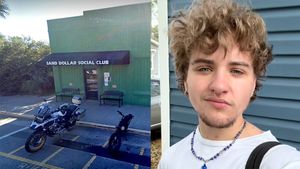Beyond the sheer
brutality of the recent hate crimes in San Diego, there
is another fact in this case that is equally disturbing. Two
of the four suspects in the Pride weekend bashings are
age 18 and under. All four of those in custody are
under the age of 25.
I find myself
wondering, How much time did those young men spend in
school learning about diversity? How many hours in
the classroom--in high school, middle school,
and even elementary school--did they hear their
teachers talk specifically about gay people? Read a book
that acknowledged the historical contributions of gay,
lesbian, bisexual, or transgender leaders? Engage in
schoolwide programs that tackled the prejudice behind
the national epidemic of bullying and youth violence?
Make it clear that antigay harassment would not be
tolerated?
I bet the answer
is close to zero.
It shouldn't take
hate crimes as ugly as these to bring our community
together to demand that schools get real with kids about all
kinds of prejudice. Schools are under enormous
pressure today to raise test scores. Why don't they
face the same level of pressure to help young people
cultivate values where all people are treated with dignity
and respect?
The National
Mental Health association has found that LGBT students hear
antigay slurs such as "homo,"
"f****t," and "sissy" about 26
times a day, or once every 14 minutes. More than 30%
of LGBT youth are threatened or injured at school in
any given year. And for every LGBT student who
reports being harassed, four straight students said they
were harassed just because they were perceived to be
gay or lesbian.
We can no longer
sit back and dismiss bullying as a rite of passage that
all kids just have to live through. Unchecked bullying
compromises student performance, damages physical and
mental health, and perpetuates a cycle that can
escalate to even greater, more brutal forms of violence,
including hate crimes.
If we want to
stop hate-based violence, we must first work to prevent
prejudice-based bullying. One of the ways to do that is to
incorporate comprehensive antibias education programs
into our schools and communities--programs aimed
at cultivating empathy and encouraging appreciation of
difference among young people.
The Respect for
All Project has a strong track record of going into
schools and doing exactly that. We believe that the way to
change the climate in schools is not just to suspend
kids who break the rules, but to find ways for
students to put themselves in the shoes of someone who
is really different than they are, even someone who is gay.
With our film
Let's Get Real, for example, we give young
audiences a chance to hear from all kinds of kids who are
targeted because of their race, their religion, their
weight, because they are in special ed, because they
are female, and yes, because someone thinks they are
gay. And we get to hear from the kids who do the bullying
about why they slammed another kid into a locker and called
him a fag, and what made them realize that that was
actually not a very cool thing to do after all.
In classroom
after classroom, kids have opened up and started to talk
about the antigay bashing that goes on in their own schools
after watching the students in Let's Get Real
tell the truth about what has happened to them.
Faculties have pulled together to find ways to make
their schools safer for all kids after participating
in the Respect for All Project's professional development
workshops.
It is possible to
reach young people and help them rethink their
assumptions about what is and is not acceptable behavior. As
students in San Diego and across the nation prepare to
return to school this month, we must ensure that
discussion of all kinds of difference, and respect for
all, are as much a part of the curriculum as improving
reading and math scores.










































































